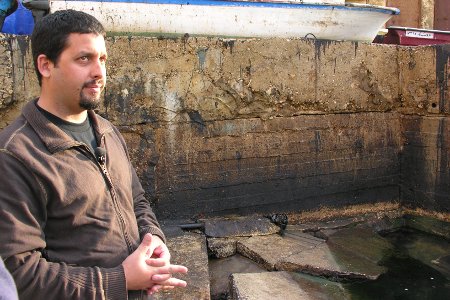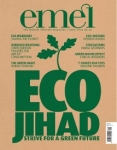
Enviornmental Activist
Issue 57 June 2009
Wael Hmaidan, 33, is co-founder of IndyACT - the League of Independent Activists - and the head of its Arab Climate Campaign. IndyACT helped establish the Arab Climate Alliance to push strong climate policy through the Arab League. He participates as a policy expert and speaker in several regional and international climate events.
At the age of 16, when Lebanon was emerging from a civil war I became an environmental activist. Growing up, I didn’t know a world without conflict, and was cynical about the selfish outlook of society. But one evening I saw a group of environmental activists on TV, risking their lives trying to prevent a ship from throwing toxic waste in the middle of the ocean. I had never before been exposed to such chivalrous dedication, and I was deeply moved by the idea of risking your life for something that might never have an effect in your lifetime. It stirred me to care about things beyond myself, and at that moment I decided to dedicate my life to environmental causes.
I soon joined Greenpeace and became coordinator of their actions in the Arab region. The impetus that had inspired me to become an activist also led me to join the Greenpeace ships for a while. Following this, for three years I was the Greenpeace campaigner for the Arab World, however, I always felt compelled to do more.
After I left Greenpeace in July 2006, Israel attacked Lebanon. This short war caused the biggest environmental disaster ever to have hit the Eastern Mediterranean: 10,000 tons of heavy fuel oil was spilt off the coast of Lebanon after Israeli jets bombed a power plant south of Beirut. Realising the implications of a major ecosystem failure, I immediately contacted a group of fellow dedicated activists. The fighting was still going on at that time, but we risked our safety to work on this environmental disaster. The turtles were hit, dolphins, urchins, and the corals too. Israel’s maritime blockade was in force, making Lebanese coastal waters far too dangerous for specialised teams to get to work on the spill. While international attention was focused on the human casualties of Israel’s month-long bombing campaign, others like me pleaded for help to save Lebanon’s pristine beaches and fragile underwater life.
When the media asked us who we were, we simply said ‘independent environmental activists’. However, after a successful campaign on the oil spill, we decided to continue working together, and support other independent activists to achieve their goals. So IndyACT – the League of Independent Activists – was established, supporting activists across the Arab World. We also create programs to promote activism among Arab youth.
In addition to managing the organisation, I continue to campaign on climate change, which threatens us all. As the main source of oil, the Arab region is a key contributor to the problem. At the same time, if we just use just a fraction of our desserts, we could provide enough solar energy to power the planet.
The region has many political conflicts, giving rise to security issues and economic difficulties. Lack of transparency, a weak media, lack of democracy, social dogmas, religious tension – all this makes it almost impossible to make any real change. Arab society provides no encouragement to pursue a life of activism. Being an activist is to defy all the social norms in our society, and entails enormous sacrifice. But it is very necessary.
Click here to return to main article
Bookmark this |
|
Add to DIGG |
|
Add to del.icio.us |
|
Stumble this |
|
Share on Facebook |
|
Share this |
|
Send to a Friend |
|
Link to this |
|
Printer Friendly |
|
Print in plain text |
|


Comments
0 Comments